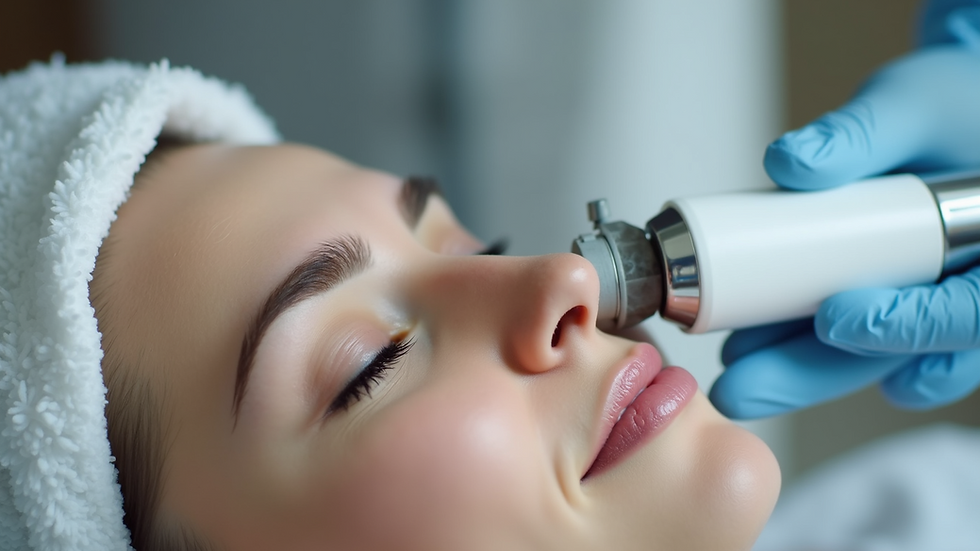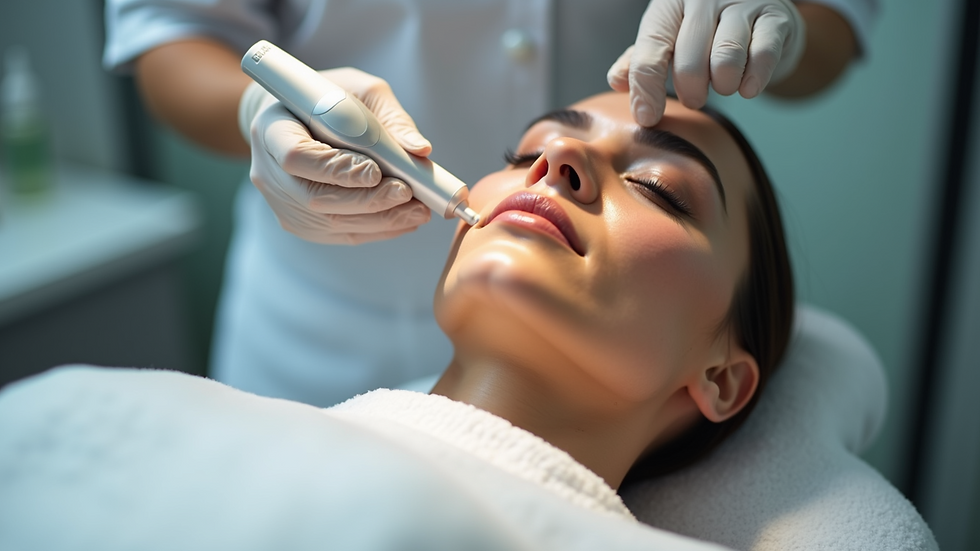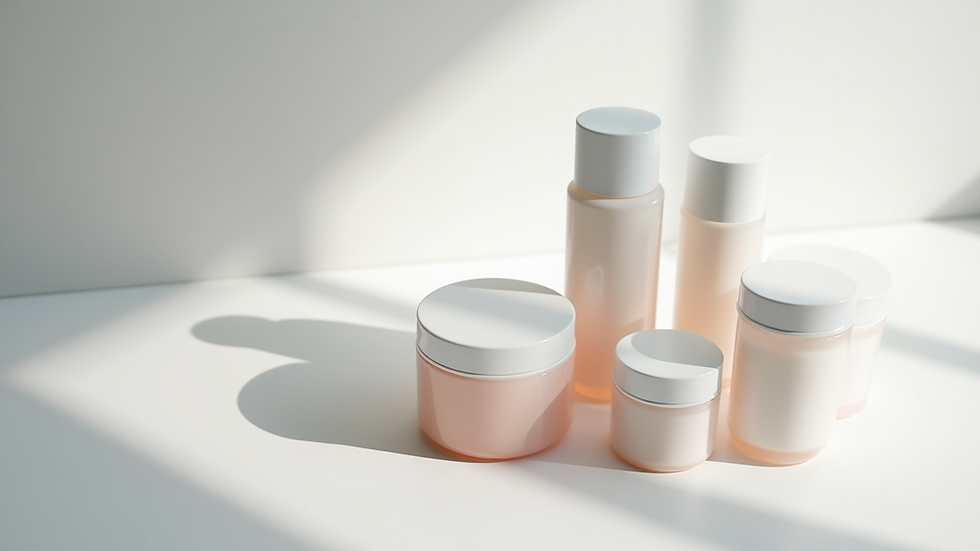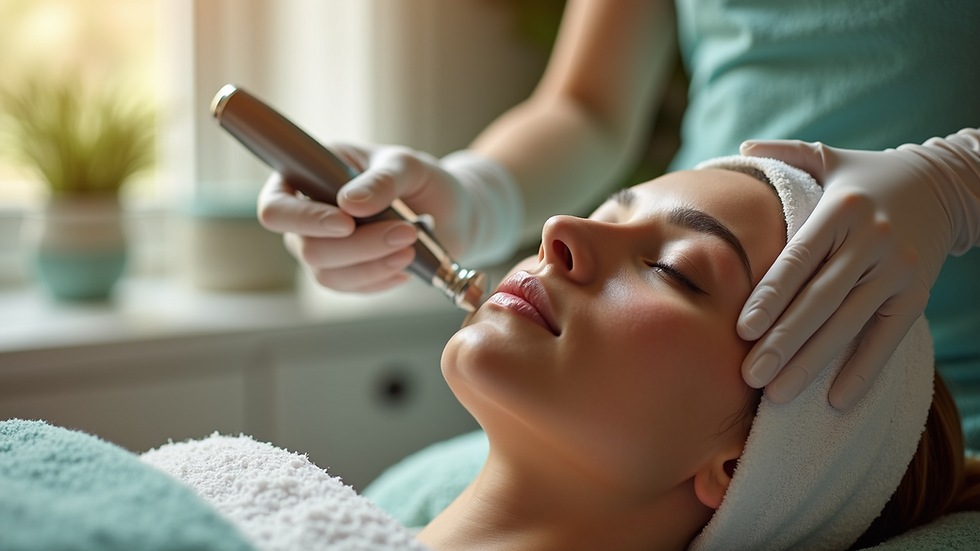What to Expect from a Microdermabrasion Session
- MindBodyBeauty Aesthetics
- Aug 5, 2025
- 4 min read
Microdermabrasion is a popular skincare treatment designed to improve the texture and appearance of your skin. If you are considering this procedure, it’s important to know what to expect during and after the session. This guide will walk you through the process, benefits, and care tips to help you make an informed decision.
Understanding Microdermabrasion and Its Benefits
Microdermabrasion is a non-invasive exfoliation technique that removes the outermost layer of dead skin cells. This treatment uses a device that sprays fine crystals or employs a diamond-tipped wand to gently abrade the skin. The process stimulates collagen production and promotes cell renewal.
Some of the key benefits include:
Smoother skin texture
Reduced appearance of fine lines and wrinkles
Minimized pores and blackheads
Improved skin tone and brightness
Enhanced absorption of skincare products
The treatment is suitable for most skin types and can be customized based on your skin’s needs. It is often used to address issues like acne scars, sun damage, and uneven pigmentation.

What Happens During a Microdermabrasion Session?
When you arrive for your session, the skincare professional will first cleanse your face to remove any makeup, oils, or dirt. This ensures the treatment is effective and hygienic.
The procedure typically lasts between 30 to 60 minutes, depending on the area being treated. Here’s what you can expect step-by-step:
Preparation: Your skin is cleansed and prepped.
Exfoliation: The microdermabrasion device is moved across your skin in gentle, sweeping motions. You may feel a mild scratching or tingling sensation.
Vacuum suction: The device also uses suction to remove dead skin cells and debris.
Soothing: After exfoliation, a calming serum or moisturizer is applied to reduce redness and hydrate the skin.
Sun protection: Since your skin will be more sensitive, a broad-spectrum sunscreen is applied before you leave.
The treatment is painless for most people, though some may experience slight redness or sensitivity immediately afterward. These effects usually subside within a few hours.

Is Microdermabrasion Good for Rosacea?
Rosacea is a chronic skin condition characterized by redness, visible blood vessels, and sometimes acne-like bumps. Many wonder if microdermabrasion is a safe option for managing rosacea symptoms.
Generally, microdermabrasion is not recommended for active rosacea flare-ups because the exfoliation and suction can irritate sensitive skin and worsen redness. However, some dermatologists may suggest a very gentle approach or alternative treatments tailored to rosacea-prone skin.
If you have rosacea and are interested in microdermabrasion, it’s crucial to consult with a skincare professional or dermatologist first. They can assess your skin condition and recommend the safest and most effective treatment plan.
Aftercare Tips to Maximize Your Results
Proper aftercare is essential to get the best results from your microdermabrasion session and to protect your skin. Here are some practical tips:
Avoid sun exposure: Your skin will be more sensitive to UV rays. Use a high SPF sunscreen daily and wear a hat when outdoors.
Keep skin hydrated: Use gentle moisturizers to soothe and nourish your skin.
Skip harsh products: Avoid exfoliants, retinoids, and strong acids for at least a week after treatment.
Stay gentle: Use mild cleansers and avoid scrubbing your face.
Follow professional advice: Your skincare provider may recommend specific products or follow-up treatments.
Regular sessions spaced a few weeks apart can enhance and maintain your results. Always communicate any unusual reactions or concerns with your skincare professional.

Understanding the Science Behind Microdermabrasion Effectiveness
The success of microdermabrasion lies in its ability to stimulate the skin’s natural healing processes. By removing the outer layer of dead cells, it encourages the production of new, healthy skin cells and collagen. This leads to a fresher, more youthful complexion.
For those interested in learning more about the science and clinical results, you can explore detailed information on microdermabrasion effectiveness.
This treatment is a great option for people looking for a quick, non-invasive way to refresh their skin without downtime. However, it’s important to have realistic expectations and understand that multiple sessions may be needed for significant improvements.
Preparing for Your First Microdermabrasion Session
Before your appointment, there are a few steps you can take to prepare:
Avoid sunburn: Stay out of the sun and avoid tanning beds for at least a week.
Discontinue certain products: Stop using retinoids, exfoliants, and other strong skincare products a few days before.
Inform your provider: Share your medical history, skin concerns, and any medications you are taking.
Arrive with a clean face: Avoid wearing makeup on the day of your treatment.
Being well-prepared helps ensure a smooth session and reduces the risk of irritation or complications.
Final Thoughts on Microdermabrasion
Microdermabrasion is a safe and effective way to rejuvenate your skin and address common concerns like dullness, fine lines, and uneven texture. The procedure is quick, generally comfortable, and requires minimal downtime.
By understanding what to expect during the session and following proper aftercare, you can enjoy glowing, healthier skin. Always seek treatment from a qualified professional and discuss your skin’s unique needs to get the best results.
If you want to explore more about skincare treatments and how microdermabrasion can fit into your routine, consider consulting with a licensed esthetician or dermatologist. They can tailor a plan that suits your goals and skin type perfectly.





Comments